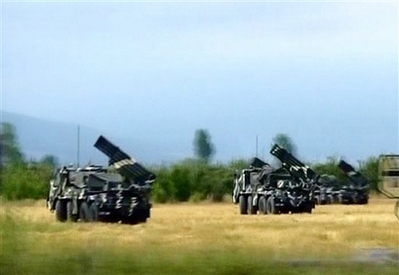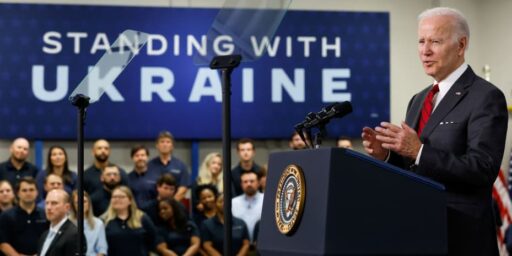Who Cares About Georgia?
Scott McConnell reports that AEI’s Fred Kagan has asked the rhetorical question, “Would the United States really want to live in a world where Russia held sway over Georgia and the Ukraine?”
Daniel Larison finds the question strange, indeed:
Obviously, I understand why Ukrainian-speaking Ukrainians and Georgians are not interested in having Russia hold sway over their countries. They want to preserve their national independence, and they view Russia as the historic oppressor or occupier that must never be allowed to regain control. I get it. I can even understand why they, or at least some of them, would actively seek the protection of other great powers to prevent that happening, but what has never been clear to me is why Americans should be willing to harm our relations with the Russians for the sake of countries in which we have no particularly important interests and which Russians consider part of their sphere of influence, if not, in fact, historically theirs. Georgians and Ukrainians may not want to live in the world Kagan paints, but an overwhelming majority of Americans would not be concerned one way or another.
That’s undoubtedly true insomuch as most Americans are unaware that there’s another place called Georgia out there for whom Herschel Walker never played. The question, though, is whether American policymakers should care if Georgia’s fate is controlled by Russia.
While I’m much more Realist than Kagan and generally subscribe to old notions such as spheres of influence and vital national interests, I nonetheless believe that the United States has a strong interest in seeing Georgia, Ukraine, and other Eastern European states continue their path to democratization rather than devolving back into Russian satellite states.
Poland, Latvia, Slovakia, and others have made remarkable strides since joining the West via membership in NATO and/or the EU. Similarly, Georgia (and to a lesser extent, Ukraine) has radically revamped its institutions, modernized its society, and otherwise become more Western in response to the prospects of membership. It’s very much in our interests that these trends continue.
As to hurting our relations with Russia, that concern continues to be overblown. Russia has opposed NATO and EU expansion at every step. They’ve learned to live with it. Their interests very much require cooperation with the West in a whole host of issues — and vice versa.
Obviously, we should be as diplomatic as possible and avoid rubbing their noses in these policy disputes. Russia has legitimate concerns and interests in the region and we should work with them closely. But it doesn’t mean turning our back on natural allies in order to appease the Russians, either.






Would the United States really want to live in a world where Russia held sway over Georgia and the Ukraine?
Um, well, we *did* live in a world like that for pretty much the entire history of the U.S. up until 1990 or so.
Georgia may not have any significant importance to the US, but it does make a nice buffer. If we let Russia cross the Georgia/Russia border now, will we stop them from crossing the Georgia/Armenia border in the future? How about Georgia/Turkey?
Nobody much cared whether Austria was governed from Vienna or Berlin in 1938. Then again, the Russians probably used the same analogy to oppose Georgian membership in NATO.
There are a variety of times when you could honestly say “Do we want to live in a world where Russia holds sway over ______”
Some times we answered no and made it stick
Greece 1946-49
Berlin 1948-52
Korea 1950 to today
Afghanistan 1979 – 89
Sometimes we just wrung our hands
Hungary 1956
Checkoslovakia 1968
and sometimes we tried and came up short (e.g. Vietnam)
In the end, the wining strategy was to be forceful and resolute, but not push any point to all out war directly with Russia (e.g. Cuban missile crisis).
It is in our interests to have more free, democratically elected governments. It makes the world safer. To the extent the Ukranians and Georgians want to defend themselves, give them the tools is a good move for us. To the extent that we put our troops to stop the soviet tanks, we need to think long and hard.
If we let Russia cross the Georgia/Russia border now, will we stop them from crossing the Georgia/Armenia border in the future? How about Georgia/Turkey?
Oh, good sweet lord. “The Russians shall not have Constantinople!”
If they didn’t manage it in 200 years, I’m not prepared to worry much about it now.
You could have said the same thing about the Muslims in 874 AD, but that didn’t stop them from eventually capturing the city.
You could have said the same thing about the Muslims in 874 AD, but that didn’t stop them from eventually capturing the city.
… 579 years later.
And then went on to capture large parts of eastern Europe which they held for many hundreds of years.
Well, historical pissing contests aside, what – other than a few good 5-year economic plans – stands between the Russia Putin is building and the old USSR?
what – other than a few good 5-year economic plans – stands between the Russia Putin is building and the old USSR?
Same empire, different tsar.
And then went on to capture large parts of eastern Europe which they held for many hundreds of years.
Today, Georgia; tomorrow, the world!
Moscow controlled the Ukraine from 1654 to 1917, and it didn’t bother the US one bit. That was a perfectly fine world. Culturally and linguistically Georgia really has very little in common with Russia – it’s more like Turkey. But Ukraine and Russia are pretty much analogous to Scotland and England. Most Ukrainians like Russia, most Ukrainians speak Russian better than their “native” language, over 17% of Ukrainians are ethnic Russians, there’s a huge amount of intermarriage, most popular media (music, books, TV) is in Russian, etc. etc. The idea that the US should be actively intervening in Ukraine is prima facie absurd. Nothing good can come of it. Ukraine will democratize hand in hand in Russia. The best way to stop that democratization process is to try to foster Ukrainian-Russian tensions.